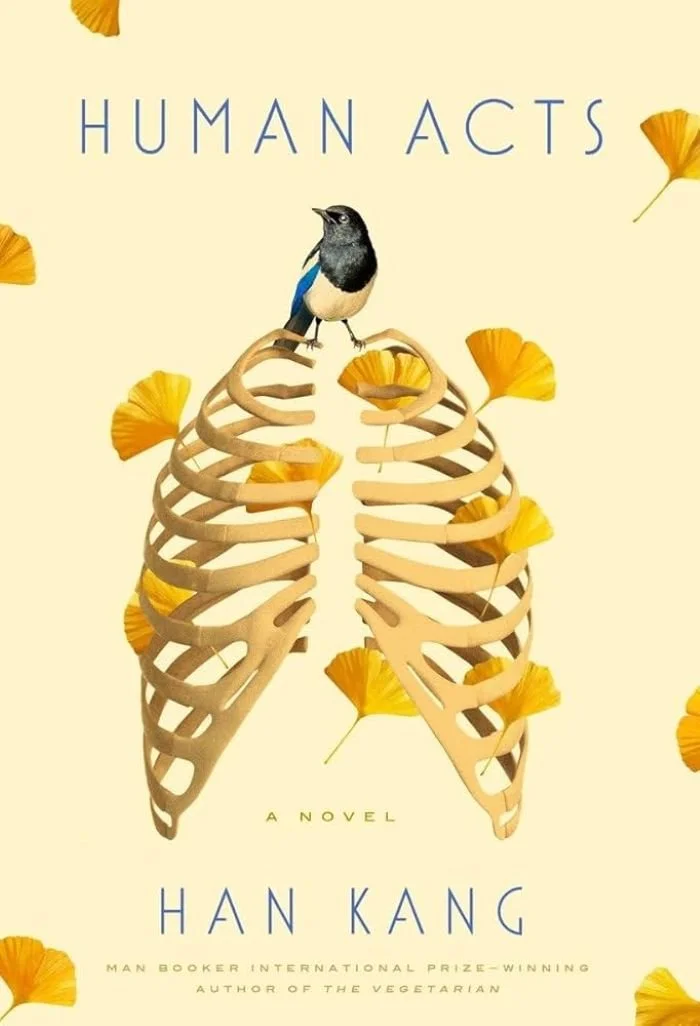Human Acts by Han Kang, translated by Deborah Smith (Hogarth) ~Ernie Hoyt
In May of 1980, I was still a junior in high school. Ronald Reagan was elected President of the United States, MADD (Mothers Against Drunk Drivers) was established, the second full length Star Wars film The Empire Strikes Back was released, and on the 18th was the eruption of Mount St. Helens. I was looking forward to my summer vacation which I would be spending in Japan.
Little did my teenage mind know what was happening halfway across the world. I did not follow current events, politics, or world news at the time. Looking back, I’m shocked by what happened on May 18, 1980 in a town called Gwangju in South Korea.
Han Kang, author of The Vegetarian (Asia by the Book, September 2024), We Do Not Part (Asia by the Book, October 2024), Greek Lessons (Asia by the Book, October 2025), and The White Book (Asia by the Book, July 2025), has also written a book about the Gwangju Uprising titled Human Acts.
Before reading the story, translator Deborah Smith, provides an introduction to the Gwangju Uprising. President Park Chung-hi who had ruled the country since 1961 was assassinated. He was assassinated by the director of his own security services.
Park had “succumbed to the classic authoritarian temptation to institute increasingly repressive measures, including scrapping the old constitution and having a new one drawn up making his ruling a de facto dictatorship”. Unfortunately, Park’s assassination was “no victory for democracy”.
Stepping into the void was Park’s right-hand man - Chun Doo-hwan. After he came into power, he implemented martial law on the entire country. He had opposition leaders arrested, closed universities, banned all political activities, and silenced the press. What is most disturbing is that today’s America seems to be reflecting South Korea’s past.
Human Acts opens a few days after the South Korean army opened fire on unarmed citizens. The President had falsely claimed that the rebels in Gwangju are communists who are in league with North Korea. As students demonstrated against martial law, they were shot, beaten and tortured by the South Korean military.
The book is written in chronological order starting with the Gwangju Uprising, also known as the Gwangju Democratization Movement and May 18 Democratization Movement. It follows a boy named Dong-ho, a middle-school student, during the incident and the people surrounding him.
The first chapter of the book introduces Dong-ho and the people surrounding him. In subsequent chapters, the narrator is one of the people that either worked with or was related to Dong-ho in some way. He has been helping people keeping a ledger of the dead bodies that were killed in the uprising. His motivation was to find his friend Jeong-day who died at the massacre.
The following chapter is told through the eyes of Dong-ho’s friend, Jeong-day. The story then jumps ahead to 1985 and is told in the first person by Eun-sok, a girl who helped Dong-ho collect dead bodies. She is now working as an editor for a publishing company. She has a clash with the police for keeping silent about the whereabouts of an author who the authorities are looking for. His play reminds her of Dong-ho who was killed by the South Korean Army.
There are others who all have their story to tell - Kim Jin-soo, who was one of the survivors of the uprising. Seon-ju who was sexually abused during the uprising. Dong-ho’s mother and finally the author herself, who was six years old at the time of the Gwangju Uprising.
This is not an easy book to stomach when you take into consideration that it was inspired by a true incident that took place less than fifty years ago. The story will stay with you long after you have finished reading it. It may interest you in learning more about how and why it happened.
When I did my own bit of research to find out what had happened to the man who instigated this crime - Chun Doo-hwan. In the 1996, August 27 issue of the Korean Times, an article wrote that the Seoul Distric Court sentenced him to Death. Later that same year, the Seoul High Court changed it to life imprisonment and a fine of 220 billion won. He was officially convicted of leading an insurrection, conspiracy to commit insurrection, taking part in an insurrection, illegal troop movement orders, dereliction of duty during martial law, murder of superior officers, attempted murder of superior officers, murder of subordinate troops, leading a rebellion, conspiracy to commit rebellion, taking part in a rebellion, and murder for the purpose of rebellion, as well as assorted crimes relating to bribery.
What I find most disturbing is that the current President of the United States is using some of the same tactics as Chun Doo-hwan such as spreading misinformation, firing anybody opposed to his views, trying to suppress the press, ordering the military to use force against American citizens. If there is something to be learned from Kang’s book Human Acts and the facts behind the Gwangju Uprising, then there should be no mistake that the man is to be ousted from office so the country will remain a democracy.
